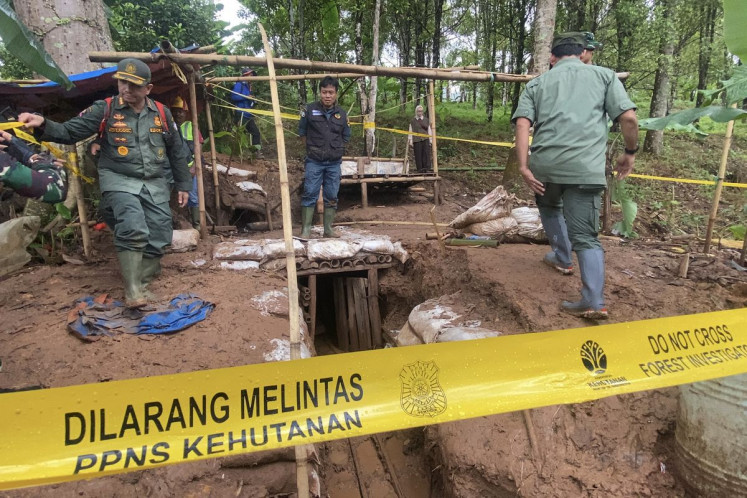Popular Reads
Top Results
Can't find what you're looking for?
View all search resultsPopular Reads
Top Results
Can't find what you're looking for?
View all search resultsGovt sets out maritime dream
The government will need to invest a mammoth Rp 699 trillion (US$57
Change text size
Gift Premium Articles
to Anyone
The government will need to invest a mammoth Rp 699 trillion (US$57.40 billion) for its sea-highway program between 2015 and 2019 in support of President Joko 'Jokowi' Widodo's maritime-axis doctrine.
National Development Planning Board (Bappenas) deputy chief for infrastructure Dedy S. Priatna said in a press conference on Friday that the investment included Rp 243.6 trillion to develop a total of 24 commercial seaports across the archipelago, Rp 198 trillion to build 1,481 non-commercial seaports and Rp 101.7 trillion to procure vessels.
Under the initiative, Dedy said the government had set a target of reducing the country's logistics costs from the current 23.5 percent of GDP to 19.2 percent in 2019.
'The investment will not be fully financed by the state budget. It can also be financed by state-owned enterprises and the private sector,' Dedy said.
Dedy said the maritime-infrastructure projects were aimed at encouraging the development of 15 industrial areas across the country, which would be developed over the next five years.
'This, however, remains a draft and it may be a subject to change. Between Jan. 15 and Jan. 20 next year, the President will issue a regulation that will bind the development plan,' he said.
He also said that within the next three or four years, the government would designate Kuala Tanjung in North Sumatra and Bitung in North Sulawesi as the country's international hubs, a plan introduced in the National Logistics Blueprint (Sislognas) of 2010-2025.
'The plan to allow foreign ships to access Kuala Tanjung and Bitung will not be realized any time soon since these ports are not ready yet,' Dedy said.
'Obviously it will also depend on the President, whether he will allow [foreign ships] to enter our seas or not.'
- Investment in five-year sea highway plan to top Rp 699 trillion
- Plan includes development of 24 commercial seaports, 1,481 non-commercial seaports and vessel procurement
- 15 industrial areas will also be developed over next five years
Meanwhile, Indonesian Logistics and Forwarders Association (ALFI) head Yukki Nugrahawan Hanafi said the association fully supported the government's sea-highway plan, however, he said intermodal connectivity should be the government's main focus in reducing logistics costs.
'We are supporting the government's sea-highway concept. However, the government should not forget that land transportation currently plays the biggest role as 80 percent of transportation users use land transportation,' Yukki told The Jakarta Post.
Yukki also said the government's plan to designate Kuala Tanjung and Bitung as the country's international hubs should be carefully thought through as state-owned port operators had invested a
great deal in building ports across Java.
'The government has also encouraged the private sector to construct Cilamaya Port in Karawang. Is the plan still on or not?,' Yukki said.
'I really think the government should not set such ambitious targets as there are a lot of aspects
that need to be considered,' he
continued.
Separately, the Indonesian Chamber of Commerce and Industry's (Kadin) deputy head for logistics affairs, Carmelita Hartoto, said the problems surrounding logistics costs were not only about the lack of infrastructure, but also the seaports' fees.
She said port fees accounted for more than 50 percent of shipping costs from one container yard to another.
'We support the government's plan to develop 24 seaports. We are ready to participate if given
the chance. But, we hope that the development of the ports won't trigger further increases in fees,' Carmelita, who is also the chairperson of the Indonesian National Shipowners Association (INSA), said.










